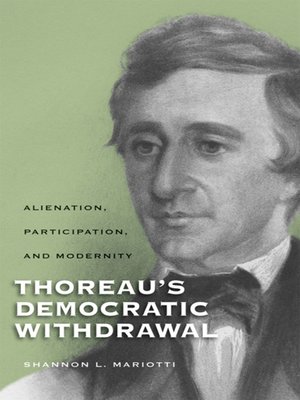Thoreau's Democratic Withdrawal
ebook ∣ Alienation, Participation, and Modernity · Studies in American Thought and Culture
By Shannon L. Mariotti

Sign up to save your library
With an OverDrive account, you can save your favorite libraries for at-a-glance information about availability. Find out more about OverDrive accounts.
Find this title in Libby, the library reading app by OverDrive.



Search for a digital library with this title
Title found at these libraries:
| Library Name | Distance |
|---|---|
| Loading... |
Best known for his two-year sojourn at Walden Pond in Massachusetts, Henry David Thoreau is often considered a recluse who emerged from solitude only occasionally to take a stand on the issues of his day. In Thoreau's Democratic Withdrawal, Shannon L. Mariotti explores Thoreau's nature writings to offer a new way of understanding the unique politics of the so-called hermit of Walden Pond. Drawing imaginatively from the twentieth-century German social theorist Theodor W. Adorno, she shows how withdrawal from the public sphere can paradoxically be a valuable part of democratic politics.
Separated by time, space, and context, Thoreau and Adorno share a common belief that critical inquiry is essential to democracy but threatened by modern society. While walking, huckleberrying, and picking wild apples, Thoreau tries to recover the capacities for independent perception and thought that are blunted by "Main Street," conventional society, and the rapidly industrializing world that surrounded him. Adorno's thoughts on particularity and the microscopic gaze he employs to work against the alienated experience of modernity help us better understand the value of Thoreau's excursions into nature. Reading Thoreau with Adorno, we see how periodic withdrawals from public spaces are not necessarily apolitical or apathetic but can revitalize our capacity for the critical thought that truly defines democracy.
In graceful, readable prose, Mariotti reintroduces us to a celebrated American thinker, offers new insights on Adorno, and highlights the striking common ground they share. Their provocative and challenging ideas, she shows, still hold lessons on how we can be responsible citizens in a society that often discourages original, critical analysis of public issues.
Separated by time, space, and context, Thoreau and Adorno share a common belief that critical inquiry is essential to democracy but threatened by modern society. While walking, huckleberrying, and picking wild apples, Thoreau tries to recover the capacities for independent perception and thought that are blunted by "Main Street," conventional society, and the rapidly industrializing world that surrounded him. Adorno's thoughts on particularity and the microscopic gaze he employs to work against the alienated experience of modernity help us better understand the value of Thoreau's excursions into nature. Reading Thoreau with Adorno, we see how periodic withdrawals from public spaces are not necessarily apolitical or apathetic but can revitalize our capacity for the critical thought that truly defines democracy.
In graceful, readable prose, Mariotti reintroduces us to a celebrated American thinker, offers new insights on Adorno, and highlights the striking common ground they share. Their provocative and challenging ideas, she shows, still hold lessons on how we can be responsible citizens in a society that often discourages original, critical analysis of public issues.







